The Measure of One's Worth: Real Estate
Back to Contents of Issue: December 2003
|
|
|
|
by John Dodd |
|
|
Stabilization
In fact, according to the Tokyo Government, nationwide commercial land prices were down 7.4 percent over last year and residential land was down 4.8 percent, so it depends where you are looking before one can say that the price drops are over. In Tokyo at least, the decline seems to be easing. Residential pricing was down just 1.8 percent and commercial properties down 3.1 percent.
TP Publishing's Steve Mansfield confirms the bottoming out: "The market appears to be bouncing along the bottom. There may be further dips but these will most likely be short lived, also there is little to suggest there will be significant price appreciation of Japanese real estate over the next few years."
Specialty values
One company that knows all about serviced offices is Servcorp, a leading serviced office company with operations in 11 countries. Servcorp is bullish on Japan and already has nine building locations at present, with another two -- one in Tokyo and one in Osaka -- opening up in the next few months. Servcorp's General Manager, Susie Martin, says: "We are experiencing increased demand from foreign companies entering the Japanese market and expect that external demand for Japanese real estate will increase."
The typical profile for a Servcorp client is a small advance group that comes to Japan to develop its business and finds within two years that it has grown to 10 to 15 people -- at which point it starts to think about branching out on its own. This prompts an expanding demand for office space.
It has been well publicized that a whole generation of home buyers (and 60.3 percent of Japanese do own their own homes) has been sucked into debt and a downward spiral by falling house prices. There are numerous cases (including the wife of this writer) of people buying very average houses in the early 90s for JPY50 million and seeing their properties today worth less than JPY30 million. Meanwhile, their 30-year bank mortgages are still up in the JPY35 to JPY40 million range -- meaning the investment is under water.
The pressure of falling prices on existing domestic housing stock appears to be ongoing, especially at the higher end of the market. Century 21 Sky Realty's Ken Arbour tells us: "Rental prices on higher end apartments are still dropping, as much as 10 percent this year, so we assume that the value for such property is still declining as well -- although not as much as last year. We think that the correction still has a little way to go, and we're not optimistic that it's over." He goes on to say: "If you are a prospective tenant, take advantage of the situation by asking your landlord to do proper renovations. We're seeing a lot more extensive work -- not just wallpaper and carpeting -- being done these days. Some landlords of more expensive properties will even pay for your move-in costs and other related fees. It pays to ask."
New housing stock in downtown areas, however, seems to be enjoying somewhat of a renaissance, as Coyo CEO Yoichi Mizukami comments: "The trend is for retired couples to sell up the family home out in the suburbs and move back into the center of Tokyo. They want the convenience and entertainment that the city can offer. This has fueled the demand for office conversions to apartments and new condominiums." A recent Forbes article confirms this: "Behind the slowing decline in central Tokyo residential land prices is continued demand for condominiums and other dwellings in the city center, with prices now at more affordable levels and convenience increased by redevelopment projects."
So it appears that those developers willing to invest time and creativity in making homes more livable are being rewarded. It also implies that demand is stable for downtown convenience. For this market segment at least, buying property could well make sense.
Yamate Home's Takeda makes an interesting side comment. She says that they are getting inquiries from foreigners overseas who are interested in buying a residence in Tokyo -- something that didn't happen much in the past. Certainly, as more and more Asian families in particular discover the joys of shopping, and entertainment such as Disneyland, in Japan, the attraction of being able to come back on repeat visits increases -- almost like keeping a condo in Hawaii. Although one imagines the sunset in Hamamatsucho is not quite the same as the one in Honolulu.
On a micro level, however, the glut of new office space, coupled with the continued slow economy, has meant that the vacancy rate for offices is at an almost record high and rents are still dropping. According to local realtor Miki Shoji, the office vacancy rate in Tokyo's Central Business District (CBD) is 8.4 percent. But the future looks better than it has for a while.
TP Publishing's Mansfield notes that "prices have dropped to a point where, with good management, real estate can generate sufficient cash flow for investors to receive a good risk adjusted return."
A recent Miki Shoji (www.e-miki.com) Tokyo real estate report says that in September 2003 in Tokyo there were 529,039 tsubo (1.7 million square meters, or 18.8 million square feet) of vacant office space, an actual decrease of 6,054 tsubo over August. According to Miki, the demand for newly completed large buildings is excellent, and at least six major projects with floor space of more than 7,000 tsubo were able to achieve full or almost full occupancy when they opened. Further-more, Miki predicts that with a marked decrease in scheduled building completions in 2004, there should be a steady recovery of the Tokyo office market.
Buying an office
According to TP Publishing's Mansfield, the answer is simple: "Possible, but difficult." Part of the consideration is of course whether or not the company is really committed to staying in Japan for the 10 or more years it would take to make a return on the initial capital investment. And also whether the amount of space needed now will be the same amount required in 10 years time -- probably an unlikely scenario.
It appears that most foreign corporate real estate purchasing falls into two categories: investment and trophy buildings. The latter category includes a number of French designer brands enjoying buoyant demand for their high-end bags and other products. These companies are creating some quite unique fashion statements in Tokyo's Omotesando district, drawing hordes of willing customers in the process. Take the JPY8.8 billion ($80 million) steel frame and glass-brick Prada building completed just this year as an example.
Apart from financial returns, a major consideration for investors buying a building in Japan is the laws concerning investment products and taxation on real estate investment.
TP Publishing actually has a book on the subject, called The Real Estate Securitization Handbook, which can be found at their web site: www.transpacific.jp/publishing/eng/books/2002cres.html.
If you're not into investment, then you are probably considering whether to rent or move to a serviced office. We asked both Space Design and Servcorp for comments on the economics of taking a serviced office. Servcorp's Martin comments: "Servcorp creates an environment where companies can focus on the core elements of their business. We ensure that valuable time is not wasted on searching for real estate, negotiating a long term lease with complex documentation, hiring and training secretarial staff, or setting up a communications system and IT. Furthermore, we can have you up and running within 24 hours."
"Our office spaces come in varying sizes and degrees of accommodation. Some function almost like hotel rooms, with appropriate levels of service and hospitality, and others are more like conventional office spaces. Each BUREX office is intelligent and ready for use."
Wrap up
If you are a non-Japanese and are intending to buy, the view seems to be that you will need to hold the investment for a few years. If you're ready to do that, now is as good a time as any to make your move.
However, before considering a purchase (an office or a house) for non-investment reasons, it is worth considering your own priorities and long-term view of staying in Japan -- because Japanese real estate requires a long-term view. As we have seen, there are now a wide range of options for securing space in Tokyo, including rentals, refurbishments, conversions, serviced offices and apartments.
The last word comes from Century 21 Sky Realty's Ken Arbour: "There are probably 10,000 foreign households in Tokyo. It is hard to think of any sector that is hiring a substantial number of people. Given the resulting lack of demand in the high-end sector, many upscale buildings are now being refurbished or redeveloped."
For those seeking a deeper and more thorough analysis of the Tokyo real estate market, Information Management Network (IMN), established in 1994 in New York City, will hold its Sixth Annual Summit on Real Estate Finance and Securitization in Japan on December 15 and 16 at the Hotel Okura. The summit promises to showcase the very latest industry developments via structured presentations, panel discussions and interactive audience participation sessions. We highly recommend this event to real estate fund managers, investors, property owners, top-level executives and entrepreneurs seeking Japanese market opportunities. Bring your questions and curiosity and be prepared to learn loads.
Finally, while the investors are putting cash back into their asssets, it seems that tenants in this country truly have a buyer's market. In short: It is a good time to be a property-seeking foreigner in Japan. @ |
|
Note: The function "email this page" is currently not supported for this page.


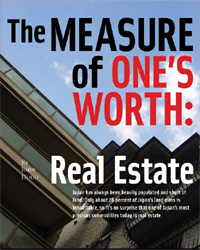 IT COMES AS SOMEWHAT of a surprise that such a precious resource could devalue so drastically in just 12 years. From a peak in 1990, property prices in Japan have plummeted over 60 percent on average, and have dropped almost 80 percent in Tokyo. Given these precipitous declines, we wondered if real estate prices in Japan have hit bottom and whether it is once again safe to think of investing in a Real Estate investment trust (REIT) or an office -- or even to buy a house.
IT COMES AS SOMEWHAT of a surprise that such a precious resource could devalue so drastically in just 12 years. From a peak in 1990, property prices in Japan have plummeted over 60 percent on average, and have dropped almost 80 percent in Tokyo. Given these precipitous declines, we wondered if real estate prices in Japan have hit bottom and whether it is once again safe to think of investing in a Real Estate investment trust (REIT) or an office -- or even to buy a house.
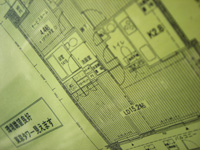 Should you buy a house?
Should you buy a house?
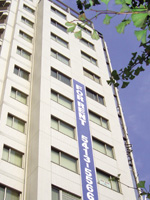 Commercial sense
Commercial sense
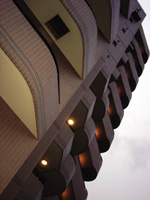 Space Design's Yamaji says of the commercial property market: "2003 has been a watershed year for property development in Tokyo. One big factor has been the redevelopment of JR East's Shiodome property. Where four years ago there were just some vacant railway marshalling yards, now Shiodome boasts some of Japan's most modern and attractive office buildings. This major project offers everyone hope about urban renewal in the near future."
Space Design's Yamaji says of the commercial property market: "2003 has been a watershed year for property development in Tokyo. One big factor has been the redevelopment of JR East's Shiodome property. Where four years ago there were just some vacant railway marshalling yards, now Shiodome boasts some of Japan's most modern and attractive office buildings. This major project offers everyone hope about urban renewal in the near future."
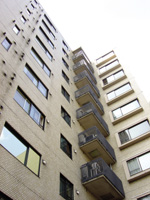 Space Design's Yamaji says: "Flexibility is a key point for companies considering a serviced office in Tokyo, and that's something we can provide.
Space Design's Yamaji says: "Flexibility is a key point for companies considering a serviced office in Tokyo, and that's something we can provide.




